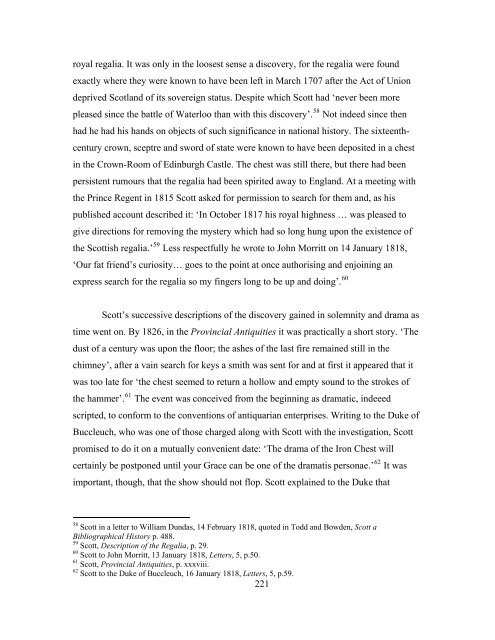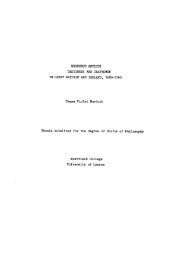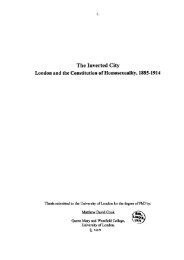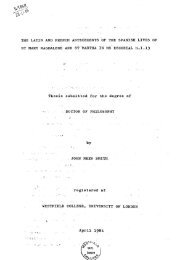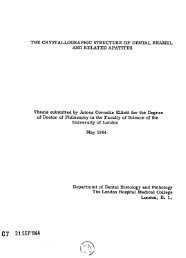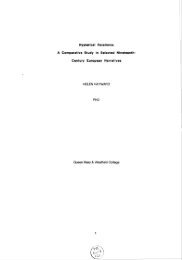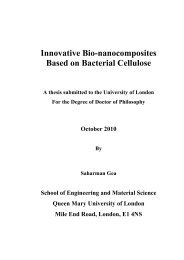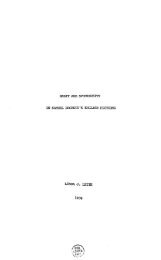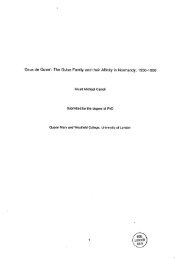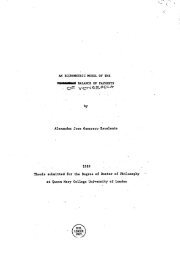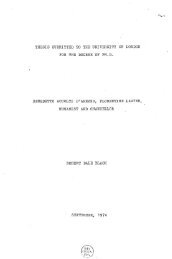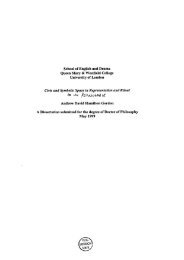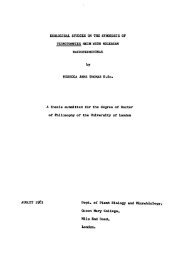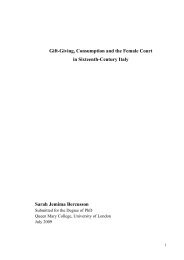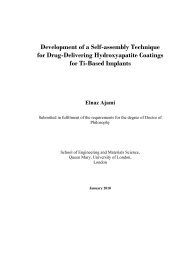Antiquaries in the Age of Romanticism: 1789-1851 - Queen Mary ...
Antiquaries in the Age of Romanticism: 1789-1851 - Queen Mary ...
Antiquaries in the Age of Romanticism: 1789-1851 - Queen Mary ...
Create successful ePaper yourself
Turn your PDF publications into a flip-book with our unique Google optimized e-Paper software.
oyal regalia. It was only <strong>in</strong> <strong>the</strong> loosest sense a discovery, for <strong>the</strong> regalia were found<br />
exactly where <strong>the</strong>y were known to have been left <strong>in</strong> March 1707 after <strong>the</strong> Act <strong>of</strong> Union<br />
deprived Scotland <strong>of</strong> its sovereign status. Despite which Scott had ‘never been more<br />
pleased s<strong>in</strong>ce <strong>the</strong> battle <strong>of</strong> Waterloo than with this discovery’. 58 Not <strong>in</strong>deed s<strong>in</strong>ce <strong>the</strong>n<br />
had he had his hands on objects <strong>of</strong> such significance <strong>in</strong> national history. The sixteenthcentury<br />
crown, sceptre and sword <strong>of</strong> state were known to have been deposited <strong>in</strong> a chest<br />
<strong>in</strong> <strong>the</strong> Crown-Room <strong>of</strong> Ed<strong>in</strong>burgh Castle. The chest was still <strong>the</strong>re, but <strong>the</strong>re had been<br />
persistent rumours that <strong>the</strong> regalia had been spirited away to England. At a meet<strong>in</strong>g with<br />
<strong>the</strong> Pr<strong>in</strong>ce Regent <strong>in</strong> 1815 Scott asked for permission to search for <strong>the</strong>m and, as his<br />
published account described it: ‘In October 1817 his royal highness … was pleased to<br />
give directions for remov<strong>in</strong>g <strong>the</strong> mystery which had so long hung upon <strong>the</strong> existence <strong>of</strong><br />
<strong>the</strong> Scottish regalia.’ 59 Less respectfully he wrote to John Morritt on 14 January 1818,<br />
‘Our fat friend’s curiosity… goes to <strong>the</strong> po<strong>in</strong>t at once authoris<strong>in</strong>g and enjo<strong>in</strong><strong>in</strong>g an<br />
express search for <strong>the</strong> regalia so my f<strong>in</strong>gers long to be up and do<strong>in</strong>g’. 60<br />
Scott’s successive descriptions <strong>of</strong> <strong>the</strong> discovery ga<strong>in</strong>ed <strong>in</strong> solemnity and drama as<br />
time went on. By 1826, <strong>in</strong> <strong>the</strong> Prov<strong>in</strong>cial Antiquities it was practically a short story. ‘The<br />
dust <strong>of</strong> a century was upon <strong>the</strong> floor; <strong>the</strong> ashes <strong>of</strong> <strong>the</strong> last fire rema<strong>in</strong>ed still <strong>in</strong> <strong>the</strong><br />
chimney’, after a va<strong>in</strong> search for keys a smith was sent for and at first it appeared that it<br />
was too late for ‘<strong>the</strong> chest seemed to return a hollow and empty sound to <strong>the</strong> strokes <strong>of</strong><br />
<strong>the</strong> hammer’. 61 The event was conceived from <strong>the</strong> beg<strong>in</strong>n<strong>in</strong>g as dramatic, <strong>in</strong>deeed<br />
scripted, to conform to <strong>the</strong> conventions <strong>of</strong> antiquarian enterprises. Writ<strong>in</strong>g to <strong>the</strong> Duke <strong>of</strong><br />
Buccleuch, who was one <strong>of</strong> those charged along with Scott with <strong>the</strong> <strong>in</strong>vestigation, Scott<br />
promised to do it on a mutually convenient date: ‘The drama <strong>of</strong> <strong>the</strong> Iron Chest will<br />
certa<strong>in</strong>ly be postponed until your Grace can be one <strong>of</strong> <strong>the</strong> dramatis personae.’ 62 It was<br />
important, though, that <strong>the</strong> show should not flop. Scott expla<strong>in</strong>ed to <strong>the</strong> Duke that<br />
58<br />
Scott <strong>in</strong> a letter to William Dundas, 14 February 1818, quoted <strong>in</strong> Todd and Bowden, Scott a<br />
Bibliographical History p. 488.<br />
59<br />
Scott, Description <strong>of</strong> <strong>the</strong> Regalia, p. 29.<br />
60<br />
Scott to John Morritt, 13 January 1818, Letters, 5, p.50.<br />
61<br />
Scott, Prov<strong>in</strong>cial Antiquities, p. xxxviii.<br />
62<br />
Scott to <strong>the</strong> Duke <strong>of</strong> Buccleuch, 16 January 1818, Letters, 5, p.59.<br />
221


